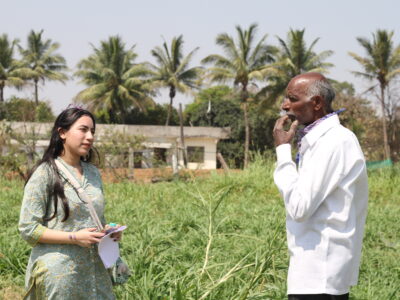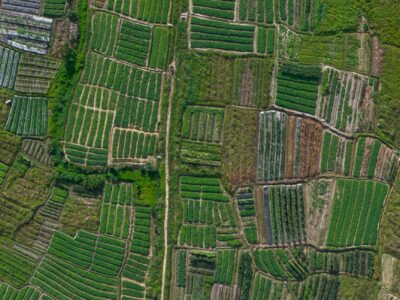
Jessica Fanzo’s career started very small—literally microscopic, as her PhD was on molecular nutrition. Since then, Fanzo has expanded the scope of her research to encompass entire continents—namely food systems in Africa and Asia—helping climate-vulnerable communities adapt to a changing climate and still have access to nutritious food.
Fanzo was recently elected to the National Academy of Sciences (NAS), which is among the highest honors in science. She is currently a professor of climate and director of the Food for Humanity Initiative at the Columbia Climate School. Her research focuses on the transdisciplinary field of food systems and the linkages between agriculture, health and the environment.
Fanzo sat down with State of the Planet to discuss her NAS appointment, why food can be such a contentious issue, and how her “super unplanned” career path made for a greater variety of life experiences. “I got lots of exposure to different disciplines and fields,” she says, “and it’s all shaped what I do today.”
The following Q&A has been edited for length and clarity.
Congratulations on being elected to the National Academy of Sciences! Were you anticipating this? Or did it come as a total surprise?
I was shocked but incredibly honored to be elected. But then I started to wonder, Am I deserving of this? Of course it’s nice to see all the work I’ve been involved with culminate and be recognized.
And I think it’s great in terms of highlighting the food space. The way we eat food contributes to climate change. The key is to find tangible solutions across food systems that can be scaled to mitigate and adapt to climate change.
Can you talk a bit about your career path and how it’s led you to where you are today?
I did my PhD in molecular nutrition. I’ve gone in quite a different direction since then, but the whole time the centerpiece was always food. For the past 20 years, I’ve been working with different organizations—I worked in two U.N. agencies, and I worked in something called CGIAR, which is a large network of agriculture development centers. Over the years, through different opportunities and my willingness to change jobs and not stay rooted in academia, I was exposed to different disciplines and fields.
My entry into working in income-constrained settings was in sub-Saharan Africa, focusing on global health and HIV. That became my re-introduction back into nutrition because many of Africa’s economies are based in agriculture. I started considering the critical linkages between agriculture and nutrition, layering in factors around environmental sustainability and a changing climate, and thinking about why and how some low-income communities are nutritionally and climate vulnerable—which makes it incredibly hard for them to adapt to changes in climate. Now, I am more focused on how climate-related extreme events impact people’s ability to access food in the immediate term.
Has the through line in your career has always been food?
I would say my major research focus has been on diets—the centerpiece of how climate, agriculture, environment and health come together. How do we ensure people have access to healthy diets? And are those diets sustainable?
A big part of that is addressing barriers in accessing food, factoring in immediate extreme events like droughts or heavy precipitation, but also the long-term impacts of climate on food security. I have also contributed to the literature and evidence base of how food systems are contributing to climate change, and what sources across food systems contribute most to the total 30% of greenhouse gases generated by the global food system. Food is a victim. It’s a problem for climate. And it’s also a solution.
These last two decades of research led to what I’m doing now: working at this interface between food systems, climate and nutrition.

“Food is a victim. It’s a problem for climate. And it’s also a solution.”
Why do you think you were nominated to the NAS this year?
Food is becoming one of the biggest challenges and most contentious political and social issue, so it’s great to see food so prominent in the disciplines [of scientists elected by the NAS].
This year, they nominated two of us that work in food systems, including my colleague Mario Herrero at Cornell. Mario and I collaborated on an initiative called the EAT-Lancet Commission report, which was published in 2019. It set out to establish scientific targets for sustainable food systems for both human and planetary health. The report has made significant impact on scientific debate in this topic as well as on policy.
Why is the subject of food so contentious?
Any time you set scientific targets around what people should eat and how we should grow food, it’s always contentious. The commission recommends a plant-dominant diet because livestock are such significant contributors to greenhouse gases. Thus the report is considered controversial for some sectors, like the livestock sector. The commission did not advocate for the complete elimination of livestock from the planet. Rather we asked: How do we produce livestock in sustainable ways that are good for the environment, good for animals, but still nourish the world’s population in a climate-resilient way?
When you were pursuing these different areas of research, did you even think all your work would come together in this way?
Not really—nothing was planned. I’ve not been very strategic in my career choices. It’s funny that we like to ask younger people or students the question, what’s your plan for the next 20 years? But plans change. No matter what choices you make and what roads you decide to take, all the experiences and choices you make add to a world of experiences. In hindsight, every decision I made in my career was the right one regardless of how careless it may have seemed at the time!
Now that you belong to this prestigious academy, does that open any paths for you?
Prior to this, I’d been involved with publications and meetings published and hosted by the NAS, and it’s always been a very enriching experience. NAS excels at bringing different disciplines and diverse views together under a banner of scientific rigor. I hope to contribute to food systems research that NAS engages in, and build on what the NAS has already been doing in the climate and food space. I hope there are opportunities to do more in terms of generating knowledge and science around food systems and what that means for climate change.
I also see the NAS as a platform for bringing really stellar scientists to the table. And maybe to focus less on the challenges, and more on the science of solutions across food systems and climate. We have focused a lot on describing the problem and why the world is the way it is. It would be great if the NAS could curate what the science and evidence are telling us about possible solutions.



